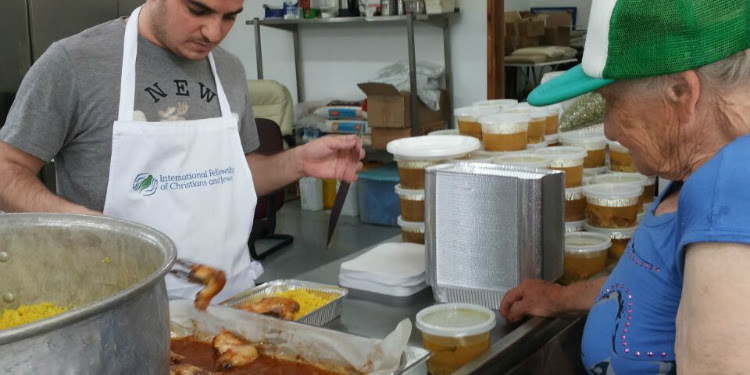Project Spotlight: Mana Hama Soup Kitchen
The Fellowship | May 1, 2018

The Fellowship‘s Ami Farkas visits our Fellowship-supported Mana Hama soup kitchen in Ashdod, sharing why this soup kitchen is vital to elderly immigrants who live in the community, like Kochana:
Every morning at 8:00 a.m., Kochana shows up at The Fellowship‘s soup kitchen in Ashdod with an empty Tupperware container in hand, even though lunch isn’t served until noon.
Kochana is one of many elderly people who arrive in the early morning hours with an empty stomach and empty to-go containers to take food home for dinner.
“We open our doors at 7:00 a.m. even though we don’t serve lunch until noon,” says Emanuel, who manages this Fellowship-supported soup kitchen. “We open our doors early because we have come to realize that this place is much more than a soup kitchen to the elderly. This is where they come to socialize, feel accepted, and share their remaining years with people who they relate to.”
Many of the elderly who come to the Fellowship-supported soup kitchen live by themselves in small, dilapidated one-room apartments. They have no food in their refrigerators, and sadly, no visitors to talk to or share moments of life with. Also, most of them are immigrants, many from Russia. They are desperate to be in the company of other elderly people who speak their language and share the same background and struggles.
Kochana, 91, is just one of many Russian elderly people who visit the soup kitchen. Even at her age, Kochana still puts on makeup every day before she comes to the soup kitchen. Nonetheless, she smiles shyly and shakes her head no when I ask to take her photo, denying me the opportunity to share her beautiful smile and sparkling eyes.
Born and raised in the former Soviet Union (FSU), Kochana recalls the harsh conditions she suffered as a child. “Food was always scarce; before, during, and after the war, we were always weak and hungry.” Kochana pauses to wipe a tear from her face, and says, “Throughout World War II, my family and I ran to save our lives, from town to town, city to city. We never rested, but we survived.”
Throughout her life, Kochana had to hide her Jewish identity. Even after WWII, anti-Semitism remained a very real and dangerous threat in the FSU. Jews did not feel safe hanging a mezuzah on their doorpost or walking the streets with a kippah on their heads. Many changed their Jewish names and observed holidays and Sabbaths in secrecy. In most places, any affiliation with the Jewish state was a crime punishable by many years of imprisonment.
Eventually, Kochana grew tired of hiding her Jewishness. She was fed up with feeling shame for being Jewish, and in 1992, she left the FSU for the Jewish state.
Today, Kochana has no family in Israel. She lives all alone in a tiny studio apartment. Her fixed income of $400 a month covers rent and utilities, yet there is no money left over for food.
“The Fellowship-supported soup kitchen is what’s keeping me alive,” Kochana says. Besides the daily hot meal and the generous servings of chicken, fish, rice, and salad she takes home in her Tupperware container each day, it also gives her a place to go for friendship.
“I come to the soup kitchen to fill the void of loneliness. I meet with friends every morning. We sit around and drink coffee, some of the ladies bring cake and other foods to share, we play cards, we sew, and, most importantly, we pass our time together. God bless you and thank you!”
